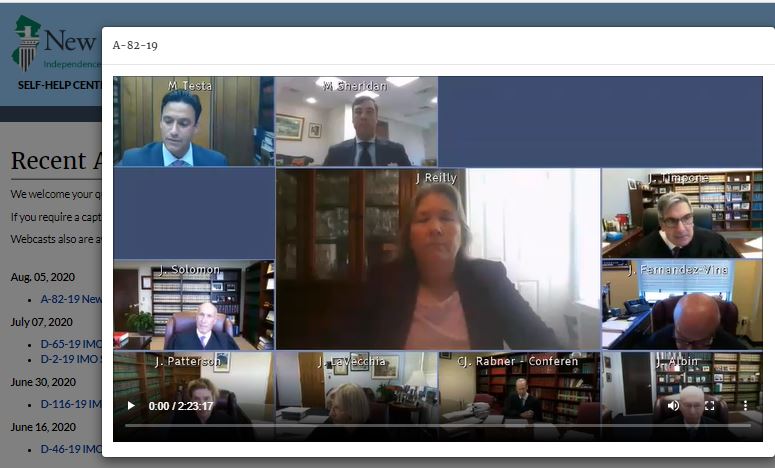While much of South Jersey was without power and internet on August 5, 2020, GOP State Senator Michael Testa and Jack Ciattarelli urged the seven NJ Supreme Court justices to require voter approval before NJ State Government could borrow $9.9 billion. Arguments were made online because of coronavirus. I filed written arguments with the Court the week before as an “Amicus Curiae” (Friend of the Court) on behalf of LibertyAndProsperity.com and Michael Smith, one of our members. All seven justices completely ignored our arguments. Photo taken from official website of NJ Supreme Court at https://www.njcourts.gov/public/webcast_archive.html.
The New Jersey Supreme Court ruled 7-0 that NJ State Government could borrow $9.7 billion without voter approval. This decision is a disgrace. Click below for complete 57 page opinion.
2020-0812-NJGOP-Murphy-full-62pg-opinion
Click here or photo for video of two and a half hours of Supreme Court hearing on August 5, 2020.
When America won independence in 1783, we were mocked by the ruling elites of Europe. They ran every level of government, and were taught “the arts of statecraft” since childhood. These were the special skills believed needed to run a government.
They were certain that the American experiment of letting ordinary merchants, farmers, doctors, and lawyers run government would be a failure. However, American government was a success. That is because Americans knew from experience that the same skills and common sense needed to run a successful farm, business, or household applied to government.
New Jersey’s State Constitution was an example of those skills and common sense. In 1837, there were widespread bank failures and a severe six year economic collapse in New Jersey and most of America. There was general agreement that this was caused by massive corruption and unsustainable borrowing by most state governments. In 1844, New Jersey adopted a new State Constitution to fix both problems to keep such a disaster from happening again. First, it required that most laws apply equally to everyone. This made it harder for politicians to sell favors in return for bribes, and for harder for business to depend on government favors, rather than good products and service, to succeed. Second, it made the new State Constitution made it very hard for state government to borrow money. The state could not borrow money unless voters approved it by voting “yes” on a ballot question. Back then, most people voted “no” on ballot questions, because they knew voting “yes” meant higher taxes. Voter approval was not needed when money was borrowed “for purposes of war, or to repel invasion, or to suppress insurrection”.
For the next 120 years, New Jersey had little or no debt, no state sales tax, and no state income tax. The best and brightest business owners and inventors, including Thomas Edison, inventor of the light bulb, movies, and sound recording, came to New Jersey.
In 1947, that part of the State Constitution was slightly modified. The Legislature could also borrow money without voter approval “to meet an emergency caused by disaster or act of God”.
Last month, Governor Murphy and Democrats in the Legislature passed a “COVID-19 Emergency Bond Act” to borrow $9.9 billion without voter approval. Of this borrowed money, $2.7 billion would be spent during the three months before October 1, and the remaining $7.2 billion is to be spent during a new nine nine month budget to begin on October 1. That budget has not yet been made! Most of that money would be spent AFTER the November 3 General Election.
How can all $9.9 billion “meet an emergency” if we have no idea how it will be spent?
Before deciding, all seven members of the New Jersey Supreme Court admitted at Page 41 that is no previous case law and that they are making up the law as they go along.
All seven then observed that the coronavirus pandemic that came to New Jersey last February was a “disaster”. To “slow the spread”, state government “shuttered private businesses”. This caused “mass unemployment”, which contributed to “a dramatic drop in revenue” to state government. The State claims it expects to collect $9.9 billion less in taxes over a 15 month period, than it originally expected. The NJ Supreme Court recognized that state government has an obligation to have “fiscal integrity” and provide “public services”.
So far, so good. However, the Supreme Court then departed from the American tradition of common sense and private business skills. It instead applied the logic of European royalty before the American experiment.
As a small town lawyer, I deal with this situation with families and business owners all the time. Most of my clients are middle class people where husband and wife both work. Sometimes, they have emergencies. A child gets sick, a roof starts leaking, a car or HVAC unit breaks down. When this happen, they have to quickly borrow money, often with a home equity loan. However, since both husband and wife are working, the debt is quickly over, and the emergency quickly comes to an end.
I also deal with a completely different kind of emergency. Here, the husband or wife gets hurt or laid off, and is out of work. As a result a family that used to earn $60,000 a year is now earning only $30,000. Responsible families immediately change their habits. They sell a car, cancel vacations, cut back on their TV cable plan, and cook meals at home. When the other spouse gets back to work, they quickly return to normal life.
Irresponsible families do things differently. They continue to spend as if they were still making $60,000. They do this by running up their credit cards, and taking out home equity loans. Few of these irresponsible families ever return to normal. When the other spouse returns to work, they find themselves in bankruptcy, foreclosure, or spending big chunks of their income paying back debt forever.
For some bizarre reason, all seven members of our State Supreme Court don’t want voters to have a say in stopping state government from acting like an irresponsible family.
They ruled that to maintain “fiscal integrity” and provide “public services”, it is “constitutional” for state politicians to borrow the entire estimated $9.9 billion budget shortfall for 15 months without voter approval.
None of these justices mentioned that New Jersey state government is already $230 billion in debt, which comes to roughly $65,000 per taxpaying household.
None explained how having New Jersey taxpayers pay $9.9 billion in new debt with interest over the next 35 years would protect the “fiscal integrity” of the state. None of them seemed concerned that the legislation calls for a new statewide real estate tax on top of existing county, local and school property taxes, with automatic yearly increases to pay this money back. (This would work just like the new automatic gas takes and toll hikes to pay back debts of the Transportation Authority.)
The justices did write about one concern. They said they did not want any of that $9.9 billion of borrowed money spent for “programs unrelated to the emergency”. But then they assured us not to worry. They pointed out that the State Treasurer appointed by Democratic Governor Murphy could be trusted not to let that happen.
None of the justices mentioned that Governor Murphy and all of the Legislators who voted to borrow $9.9 billion are up for election next year. None of them mentioned that all of them are supported by the CWA and other public employee unions whose members will get most of that $9.9 billion in salaries, pensions and benefits.
None of the justices mentioned that our State Constitution was written by people who recognized that politicians get elected and re-elected by spending money to win votes. The framers of our State Constitution also knew that politicians love to borrow money because it lets them buy votes without raising taxes. in the 1830’s, politicians caused a horrible six year economic collapse by doing that. Our State Constitution was specifically designed to take this power away from politicians and give it to the voters who are stuck with the high taxes to pay back this debt years later.
Several people have asked if we can appeal this rotten decision to the U.S. Supreme Court. The answer is no. Federal courts, not even the U.S. Supreme Court, have the power to interpret state constitutions.
However, I am convinced that in a few years, federal courts will be asked to straighten out this mess. That will happen when New Jersey is unable to collect enough taxes to pay its unsustainable debts—including pensions and health benefits to retired government workers. At that time, federal courts will have to decide whether bondholders or pensions get paid first, and how many pennies each of them will get on the dollar.
The real tragedy is that by gutting our State Constitution, our New Jersey Supreme Court has allowed state government to re-create the same pay-to-play corruption and unsustainable debt that cause the economic collapse of 1837. The only difference is that in 1837, millions of Americans lost their life savings when the banks failed. This time, millions will lose their life savings when pension fund investments fail, and pension checks suddenly stop coming.
- We are a group of 150 ordinary citizens who mostly live near Atlantic City, New Jersey. We volunteer our time and money to maintain this website. We do our best to post accurate information. However, we have made mistakes. If you see any mistakes or inaccurate, misleading, outdated, or incomplete information in this or any of our posts, please let us know. We will do our best to correct the problem as soon as possible.
- Seth Grossman, Executive Director
- LibertyAndProsperity.com
- info@libertyandprosperity.com
- (609) 927-7333


